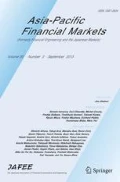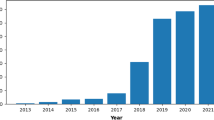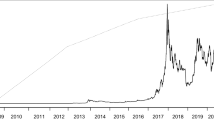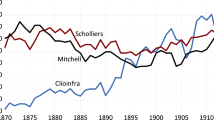Abstract
This paper is the first empirical paper to study the relationship between Bitcoin energy consumption and its market. Using the variance decompositions in combination with realized semi-variances for daily data, we find a relationship between Bitcoin energy consumption and its returns as well as volumes. Additionally, the directional impact from Bitcoin trading volumes to its energy consumption is higher than returns in the long run. The second Bitcoin crash also induces a higher connectedness of energy usage. Finally, we found the predictive power of energy on Bitcoin returns and volume. It holds true for the opposite predictive direction. Our results draw a challenge to the cryptocurrency ecosystems to sustainably innovate to impede their carbon footprint.




Similar content being viewed by others
Change history
18 June 2021
A Correction to this paper has been published: https://doi.org/10.1007/s10690-021-09345-5
Notes
After taking the Vector Auto-regression (VAR) based on the optimal lag selection (from the criteria of AIC, HQIC, SBIC of 4 periods), we estimate the Granger causality.
References
Antonakakis, N., Chatziantoniou, I., & Gabauer, D. (2020). Refined measures of dynamic connectedness based on time-varying parameter vector autoregressions. Journal of Risk and Financial Management, 13(4), 84
Balcilar, M., Bouri, E., Gupta, R., & Roubaud, D. (2017). Can volume predict Bitcoin returns and volatility? A quantiles-based approach. Economic Modeling, 64, 74–81
Barunik, J., & Kocenda, E. (2019). Total asymmetric and frequency connectedness between oil and forex markets. The Energy Journal. https://doi.org/10.5547/01956574.40.SI2.jbar
Barunik, J., & Krehlik, T. (2018). Measuring the frequency dynamics of financial connectedness and systemic risk. Journal of Financial Econometrics, 16(2), 271–296
Baur, D. G., & Oll, J. (2019). The (un-) sustainability of bitcoin investments. Available at SSRN. https://doi.org/10.2139/ssrn.3365820
Bouri, E., Jalkh, N., Molnár, P., & Roubaud, D. (2017). Bitcoin for energy commodities before and after the December 2013 crash: Diversifier, hedge or safe haven? Applied Economics, 49(50), 5063–5073
Bouri, E., Molnár, P., Azzi, G., Roubaud, D., & Hagfors, L. I. (2017). On the hedge and safe haven properties of Bitcoin: Is it really more than a diversifier? Finance Research Letters, 20, 192–198
Bouri, E., Gupta, R., & Roubaud, D. (2019). Herding behaviour in cryptocurrencies. Finance Research Letters, 29, 216–221
Burggraf, T., Huynh, T. L. D., Rudolf, M., & Wang, M. (2020). Do FEARS drive Bitcoin? Review of Behavioral Finance. https://doi.org/10.1108/RBF-11-2019-0161
Calvo-Pardo, H. F., Mancini, T., & Olmo, J. (2020). Machine Learning the Carbon Footprint of Bitcoin Mining. Available at SSRN 3647593
Corbet, S., Lucey, B. M., & Yarovaya, L. (2019). The financial market effects of cryptocurrency energy usage. Available at SSRN. https://doi.org/10.2139/ssrn.3412194
Corbet, S., Lucey, B., & Yarovaya, L. (2021). Bitcoin-energy markets interrelationships-New evidence. Resources Policy, 70, 101916
Das, D., & Dutta, A. (2020). Bitcoin’s energy consumption: Is it the Achilles heel to miner’s revenue? Economics Letters, 186, 108530
De Vries, A. (2018). Bitcoin’s growing energy problem. Joule, 2(5), 801–805
De Vries, A. (2020). Bitcoin’s energy consumption is underestimated: A market dynamics approach. Energy Research & Social Science, 70, 101721. https://doi.org/10.1016/j.erss.2020.101721
Dey, S. R., & Tareque, M. (2019). Electricity consumption and GDP nexus in Bangladesh: A time series investigation. Journal of Asian Business and Economic Studies, 27(1), 35–48
Diebold, F. X., & Yilmaz, K. (2012). Better to give than to receive: Predictive directional measurement of volatility spillovers. International Journal of Forecasting, 28(1), 57–66
Easley, D., O’Hara, M., & Basu, S. (2019). From mining to markets: The evolution of bitcoin transaction fees. Journal of Financial Economics, 134(1), 91–109
El Alaoui, M., Bouri, E., & Roubaud, D. (2019). Bitcoin price–volume: A multifractal cross-correlation approach. Finance Research Letters. https://doi.org/10.1016/j.frl.2018.12.011
Foley, S., Karlsen, J. R., & Putniņš, T. J. (2019). Sex, drugs, and bitcoin: How much illegal activity is financed through cryptocurrencies? The Review of Financial Studies, 32(5), 1798–1853
Gkillas, K., Bouri, E., Gupta, R., & Roubaud, D. (2020). Spillovers in Higher-Order Moments of Crude Oil, Gold, and Bitcoin. The Quarterly Review of Economics and Finance. https://doi.org/10.1016/j.qref.2020.08.004
Goodkind, A. L., Jones, B. A., & Berrens, R. P. (2020). Cryptodamages: Monetary value estimates of the air pollution and human health impacts of cryptocurrency mining. Energy Research & Social Science, 59, 101281
Greenberg, P., & Bugden, D. (2019). Energy consumption boomtowns in the United States: Community responses to a cryptocurrency boom. Energy Research & Social Science, 50, 162–167
Hayes, A. S. (2017). Cryptocurrency value formation: An empirical study leading to a cost of production model for valuing bitcoin. Telematics and Informatics, 34(7), 1308–1321
Howson, P. (2019). Tackling climate change with blockchain. Nature Climate Change, 9(9), 644–645
Huynh, T. L. D., Wang, M., & Vo, X. V. (2019). Economic Policy Uncertainty and the Bitcoin market. Singapore Economic Review. https://doi.org/10.1142/S0217590821500119
Huynh, T. L. D., Burggraf, T., & Wang, M. (2020a). Gold, platinum, and expected Bitcoin returns. Journal of Multinational Financial Management, 56, 100628
Huynh, T. L. D., Hille, E., & Nasir, M. A. (2020b). Diversification in the age of the 4th industrial revolution: The role of artificial intelligence, green bonds and cryptocurrencies. Technological Forecasting and Social Change, 159, 120188
Huynh, T. L. D., Shahbaz, M., Nasir, M. A., & Ullah, S. (2020). Financial modelling, risk management of energy instruments and the role of cryptocurrencies. Annals of Operations Research, 1–29
Ji, Q., Bouri, E., Roubaud, D., & Kristoufek, L. (2019). Information interdependence among energy, cryptocurrency and major commodity markets. Energy Economics, 81, 1042–1055
Kovilage, M. P. (2020). Influence of lean–green practices on organizational sustainable performance. Journal of Asian Business and Economic Studies. https://doi.org/10.1108/JABES-11-2019-0115
Krause, M. J., & Tolaymat, T. (2018). Quantification of energy and carbon costs for mining cryptocurrencies. Nature Sustainability, 1(11), 711
Kristjanpoller, W., Bouri, E., & Takaishi, T. (2020). Cryptocurrencies and equity funds: Evidence from an asymmetric multifractal analysis. Physica a: Statistical Mechanics and Its Applications, 545, 123711
Kurihara, Y., & Fukushima, A. (2017). The market efficiency of Bitcoin: A weekly anomaly perspective. Journal of Applied Finance and Banking, 7(3), 57
Li, J., Li, N., Peng, J., Cui, H., & Wu, Z. (2019). Energy consumption of cryptocurrency mining: A study of electricity consumption in mining cryptocurrencies. Energy, 168, 160–168
Maghyereh, A. I., Awartani, B., & Bouri, E. (2016). The directional volatility connectedness between crude oil and equity markets: New evidence from implied volatility indexes. Energy Economics, 57, 78–93
Mora, C., Rollins, R. L., Taladay, K., Kantar, M. B., Chock, M. K., Shimada, M., & Franklin, E. C. (2018). Bitcoin emissions alone could push global warming above 2 c. Nature Climate Change, 8(11), 931
Naeem, M., Bouri, E., Boako, G., & Roubaud, D. (2020). Tail dependence in the return-volume of leading cryptocurrencies. Finance Research Letters, 36, 101326
Nakamoto, S. (2009). Bitcoin: A peer-to-peer electronic cash system. Technical report, Manubot.
Nasir, M. A., Huynh, T. L. D., Nguyen, S. P., & Duong, D. (2019). Forecasting cryptocurrency returns and volume using search engines. Financial Innovation, 5(1), 1–13
O'Dwyer, K. J., & Malone, D. (2014). Bitcoin mining and its energy footprint
Pham, L., & Huynh, T. L. D. (2020). How does investor attention influence the green bond market? Finance Research Letters, 35, 101533
Salimitari, M., Chatterjee, M., Yuksel, M., & Pasiliao, E. (2017). Profit maximization for bitcoin pool mining: A prospect theoretic approach. In 2017 IEEE 3rd international conference on collaboration and internet computing (CIC) (pp. 267–274). IEEE
Shahzad, S. J. H., Bouri, E., Roubaud, D., Kristoufek, L., & Lucey, B. (2019). Is Bitcoin a better safe-haven investment than gold and commodities? International Review of Financial Analysis, 63, 322–330
Singhal, A., & Rafiuddin, A. (2014). Role of bitcoin on economy. In Proceedings of the World Congress on Engineering and Computer Science (Vol. 2)
Stensås, A., Nygaard, M. F., Kyaw, K., & Treepongkaruna, S. (2019). Can Bitcoin be a diversifier, hedge or safe haven tool? Cogent Economics & Finance, 7(1), 1593072
Stoll, C., Klaaßen, L., & Gallersd ̈orfer, U. . (2019). The carbon footprint of bitcoin. Joule., 3(7), 1647–1661. https://doi.org/10.1016/j.joule.2019.05.012
Taylor, M. B. (2013). Bitcoin and the age of bespoke silicon. In 2013 international conference on compilers, architecture and synthesis for embedded systems (CASES) (pp. 1–10). IEEE
Truby, J. (2018). Decarbonizing bitcoin: Law and policy choices for reducing the energy consumption of blockchain technologies and digital currencies. Energy Research & Social Science, 44, 399–410
Vranken, H. (2017). Sustainability of bitcoin and blockchains. Current Opinion in Environmental Sustainability, 28, 1–9
Wang, G., Tang, Y., Xie, C., & Chen, S. (2019). Is bitcoin a safe haven or a hedging asset? Evidence from China. Journal of Management Science and Engineering, 4(3), 173–188
Yuneline, M. H. (2019). Analysis of cryptocurrency’s characteristics in four perspectives. Journal of Asian Business and Economic Studies, 26(2), 206–219
Author information
Authors and Affiliations
Corresponding author
Additional information
Publisher's Note
Springer Nature remains neutral with regard to jurisdictional claims in published maps and institutional affiliations.
Rights and permissions
About this article
Cite this article
Huynh, A.N.Q., Duong, D., Burggraf, T. et al. Energy Consumption and Bitcoin Market. Asia-Pac Financ Markets 29, 79–93 (2022). https://doi.org/10.1007/s10690-021-09338-4
Accepted:
Published:
Issue Date:
DOI: https://doi.org/10.1007/s10690-021-09338-4




